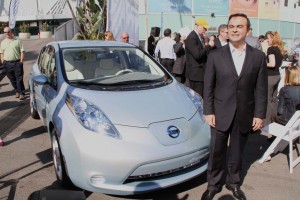The floor of the Paris Motor Show is covered with an array of hybrids, plug-ins and pure battery-electric vehicles, the latter ranging from the little Nissan Leaf up to the new Mercedes-Benz SLS AMG Electric Drive.
But barring a sudden shift in consumer sentiment, demand for battery-based products has filed to charge up the sales charts. That’s particularly true for the Leaf, which has experienced an unexpectedly sharp decline in demand in the critical U.S. market this year.
Asked whether that worries him as Nissan prepares to open a new Nashville assembly line for the Leaf, the maker’s CEO Carlos Ghosn responded that, “If you ask a CEO if he is disappointed in the level of sales, you are always going to get “yes” for an answer.”
But the Brazilian-born executive, who also serves as chief executive of Nissan’s alliance partner, Renault, insisted that rather than panic, “We will be patient.”
The real question, he suggested, is “Why are we not getting the level of sales we expected?”
And for that, Ghosn pointed to a variety of factors including range limits and the high cost of battery technology. But perhaps even more of an issue is the need for “a profound change in the attitude of the consumer.”
He suggested that will take quite some time to change, but sees sign that there is a bit of momentum building. In part, that comes from high levels, “More and more people in charge of cities, states and countries who understand and are willing to support” the move towards electrification.
In France, for example, the government recently increased incentives on battery cars from 5,000 to 7,500 Euros.
Ironically, the slow start of the battery car market may actually work towards its long-term benefit. When Nissan began work on the Leaf, in 2006, Ghosn said there were very few places the maker could get the necessary lithium-ion batteries. Now, however, there are plenty of vendors in Asia and North America and with less-than-expected demand they are competing on price, as well as on improved battery technology.
Estimates of how much costs will come down varies. When Nissan began the Leaf program many experts reported pricing for lithium technology at around $1,000 per kilowatt-hour, a hefty burden considering the 24 kWh of batteries in the Nissan vehicle. Some industry sources suggest pricing is rapidly dropping to as little as $500 per kWh or even below. But most analysts contend the real breakthrough won’t occur until it reaches around $200, making battery cars reasonably cost-competitive with gasoline power.
Though Ghosn is a no-nonsense business executive, those who know him insist his belief in battery power goes far beyond economics, something he underscored by calling the switch to the clean technology “critical.”
He is backing that up with cash at both Nissan and Renault. The addition of the Tennessee Leaf line will bring capacity to nearly 250,000 and with plans for battery cars falling into place at the French side of the alliance, total capacity will top 550,000 by around mid-decade.
Whether consumers will deliver the level of orders to support that investment is far from certain.

